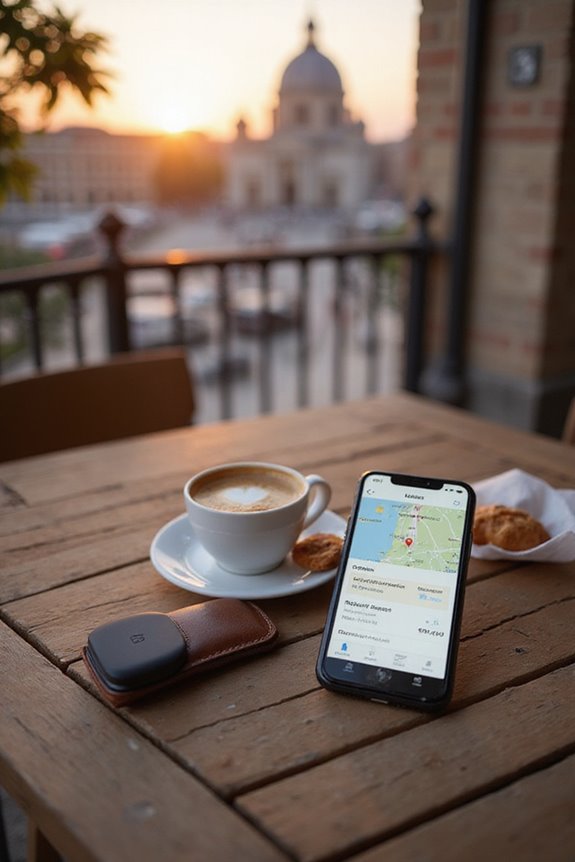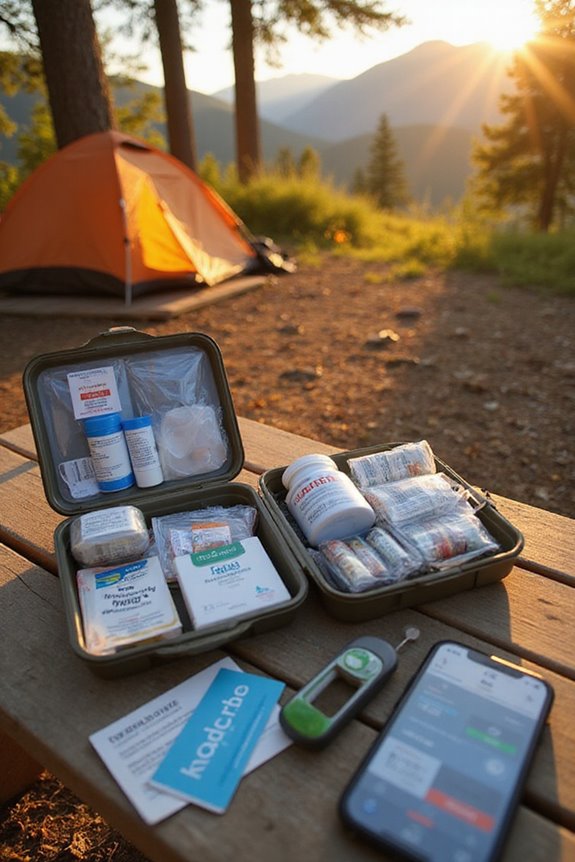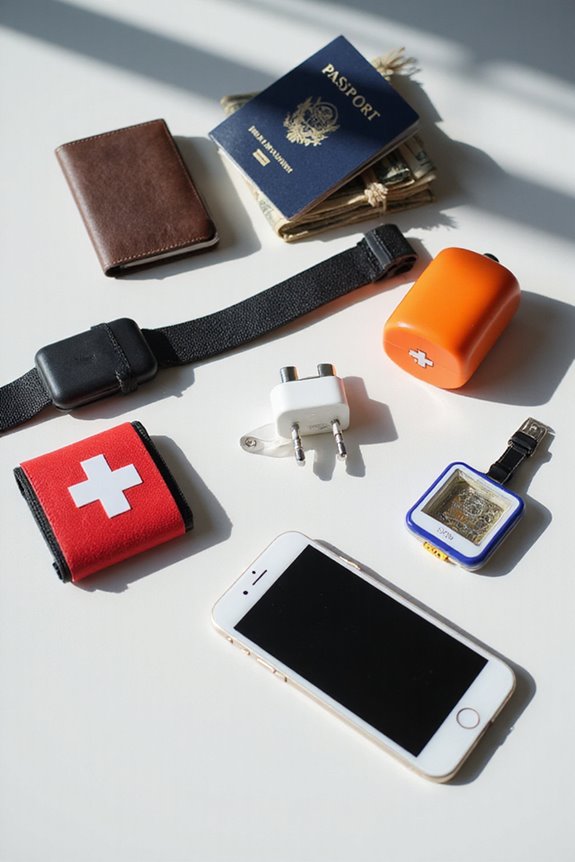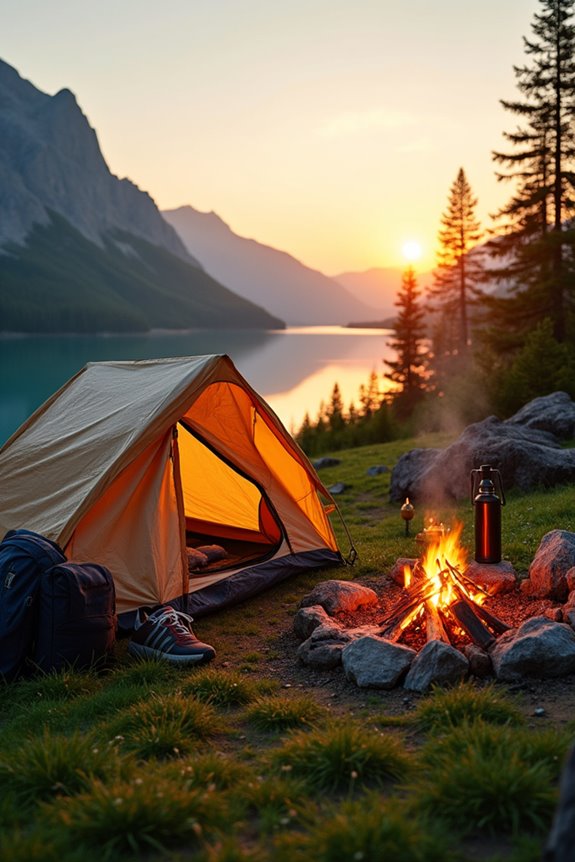Staying safe while traveling abroad is all about preparation and vigilance. Start by researching your destination’s health and safety info, like crime rates and local laws. Keep your plans low-key, and always trust your gut feelings. Make sure to have emergency contacts ready, like local police numbers, and stay off public Wi-Fi. Don’t forget your health records and necessary vaccinations. With the right strategies, you can create unforgettable memories without the worries. Want to learn more?
Key Takeaways
- Research your destination’s safety, health risks, and local laws to make informed travel decisions.
- Keep emergency contacts, including local police and medical facilities, easily accessible for quick reference.
- Use technology wisely by securing devices with strong passwords and avoiding public Wi-Fi connections.
- Ensure compliance with vaccination requirements and carry necessary medical documents for health preparedness.
- Maintain awareness of your surroundings and trust your instincts to stay safe while exploring.
Assessing Destination Risks
How can travelers guarantee they’re stepping into a safe adventure rather than a risk-laden journey? It starts with a solid risk assessment. Before packing those bags, savvy travelers gather essential information about their destination, from health data like vaccination needs to security threat levels. It’s vital to understand local laws, crime rates, and even environmental risks like hurricanes that could rain on their parade. Plus, don’t forget travel insurance! This safety net guarantees that if plans go haywire, like missing a connecting flight or needing medical attention, assistance is just a phone call away. With a little preparation, travelers can transform anxiety into excitement, focusing on making memories rather than worrying about what might go wrong.
Choosing Safer Destinations

What makes a destination feel safe and inviting? It’s often a mix of low crime rates, friendly locals, and a touch of cultural consideration. For instance, countries like Iceland and Singapore shine with minimal crime and welcoming communities. Travelers should check safety indices and consider political stability before choosing where to roam. It’s also wise to keep travel insurance handy, just in case unexpected bumps arise. Countries like Portugal and the UAE provide a comforting atmosphere with visible law enforcement and vibrant local culture. When picking a destination, think about how social trust and economic stability contribute to safety. Ultimately, a little research can lead to wonderful adventures in the world’s safest corners, keeping worries at bay!
Personal Security Precautions

Staying safe while traveling is all about those little personal security precautions that can make a world of difference. For starters, keeping travel plans under wraps helps avoid unwanted attention. Utilizing secure communication channels, like encryption for messages, guarantees personal awareness of potential threats. Staying informed about local conditions can guide smart decisions, while having a solid emergency plan provides peace of mind. Always maintain a keen sense of your surroundings—trusting instincts can signal danger before it strikes. Avoiding flashy jewelry and traveling in groups at night can also enhance travel safety. With these simple yet powerful steps, travelers can greatly bolster their security, creating memorable experiences without unnecessary worry.
Using Technology for Enhanced Safety

Ever wonder how technology can act as a trusty sidekick while trekking through unfamiliar territories? When traveling abroad, securing devices is vital. Start by enabling full disk encryption and using strong passwords to protect your digital privacy. Power down devices at borders to thwart potential cyberattacks. It’s wise to carry only essential data and back everything up securely—think of it as your digital safety net. When it comes to communication, avoid public Wi-Fi and opt for a reliable VPN to guarantee secure communication. Utilizing cellular data plans for sensitive chats is a smart move. Remember, technology can enhance safety, but staying informed and cautious is the real key to a worry-free adventure abroad.
Health and Medical Preparedness

Charting new destinations can be a thrilling adventure, but it also comes with its fair share of health risks that travelers often overlook. Ensuring vaccine compliance is essential, especially for trips to areas like Africa or Asia, where diseases like yellow fever or measles can lurk. Before jetting off, travelers should consult healthcare providers for tailored vaccination plans. Equally important is securing solid health insurance. Without it, the cost of medical care abroad can turn a dream trip into a financial nightmare. Keeping portable medical records and a list of medications handy can be lifesavers in emergencies. So, pack those vaccines and insurance papers; it’s better to be safe than sorry when exploring the world!
Emergency Response Planning
When traveling abroad, the last thing anyone wants is to be caught off guard in an emergency, and that’s where having a solid emergency response plan comes into play. Travelers should familiarize themselves with local emergency protocols, ensuring they know how to react in various situations. It’s essential to have a backup plan, like knowing the nearest hospital or having emergency contacts saved on your phone. Crisis communication becomes significant; understanding how to receive alerts in the local language can make all the difference. Engaging with local authorities and tourism boards helps bridge gaps in emergency preparedness, creating a smoother experience. By staying informed and connected, travelers can navigate emergencies with confidence, turning potential chaos into manageable challenges.
Understanding Travel Advisories
How can travelers navigate the maze of information when it comes to safety abroad? Understanding travel advisories is vital. Countries like the U.S. and Canada offer travel advisory sources that categorize safety levels, ranging from “Exercise Normal Precautions” to “Do Not Travel.” This advisory level interpretation helps travelers assess risks before packing their bags. Some regions may even have different advisories within a single country due to local conditions. Staying updated is key, as these advisories can change quickly, reflecting the safety landscape. Travelers can avoid high-risk areas and plan safer routes by heeding these warnings, ultimately making informed decisions that make their adventures more enjoyable and secure. Remember, a little caution can go a long way!
Staying Informed About Local Conditions
Staying informed about local conditions can feel like traversing a jungle of ever-changing information, but it’s vital for a smooth travel experience. Travelers should keep an eye on local news and trusted international outlets, which can provide essential updates on political unrest or weather changes. Social media is another treasure trove, where firsthand reports from other travelers can illuminate the truth behind the headlines. Signing up for the Smart Traveler Enrollment Program (STEP) offers real-time alerts specific to one’s itinerary, while the CDC keeps tabs on health risks. Combining these resources not only enhances safety but also guarantees travelers can navigate their adventures with confidence, avoiding the pitfalls that come from being uninformed.
Safeguarding Personal Belongings
Traveling can be exhilarating, but it often comes with the nagging worry of safeguarding personal belongings. To keep valuables safe, travelers should opt for secure storage options like hidden pocket scarves or money belts, cleverly concealing cash and passports. Avoid flaunting these items in busy tourist spots—discretion is key! For extra security, portable safes like the Vaultek Lifepod are a must, outshining many hotel safes. When it comes to luggage, consider bags with anti-theft features and attach valuable tracking devices, like Apple AirTags. This way, lost items can be tracked effortlessly. Remember, staying vigilant during transit is essential; keep belongings close and out of sight, especially in crowded areas. A little caution can go a long way in preserving peace of mind!
Building a Support Network While Traveling
While exploring new destinations, the importance of building a support network cannot be overstated. Connecting with local residents or fellow travelers can turn a solo trip into a shared adventure. Before heading out, one should engage in research to identify local connections and join travel forums or social media groups, where advice flows like a friendly chat over coffee. Once there, engaging with community resources, like language exchanges or cultural meetups, can foster meaningful relationships. It’s also wise to register with the local embassy for updates and support. Plus, don’t forget to save emergency contacts—think local police or medical facilities—in the local language. With a strong support network, travelers can explore confidently, knowing help is just a message away.
Frequently Asked Questions
How Can I Find Local Emergency Services While Traveling?
In unfamiliar landscapes, travelers become explorers seeking hidden maps; they must gather local resources, research emergency contacts, and secure essential numbers to navigate unforeseen challenges, ensuring their journey remains safe amid the unknown.
What Should I Do if I Lose My Passport Abroad?
Upon losing a passport abroad, one should seek passport replacement by contacting emergency contacts like the local embassy, reporting the loss to police, and preparing necessary documentation to facilitate the replacement process efficiently.
Are There Specific Travel Insurance Options for Adventure Activities?
In the age of knights, securing adventure coverage was paramount. Today, policies often exclude higher-risk activities. Travelers should meticulously review policy exclusions to guarantee they have appropriate protection for their daring pursuits during their adventures.
How Do I Handle Cultural Differences and Etiquette in Foreign Countries?
Maneuvering cultural differences requires understanding local norms and practicing etiquette tips. Observing behaviors, respecting traditions, and demonstrating openness to new experiences considerably enhance interactions and foster appreciation for diverse customs in foreign countries.
What Are the Best Practices for Communicating With Locals?
Effective communication with locals necessitates mastering basic local phrases, utilizing body language, and demonstrating cultural sensitivity. By adopting simple expressions and respectful gestures, travelers can foster goodwill and enhance understanding, leading to more meaningful interactions.





